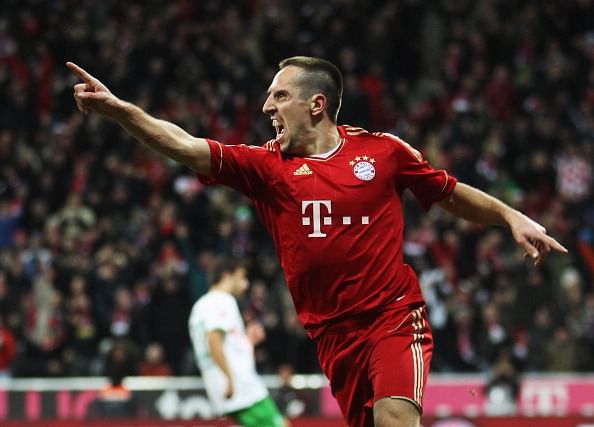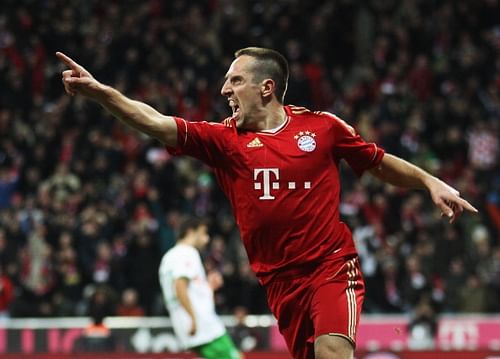
Legends of club football: Franck Ribery

“Do you know it only took Germany three days to conquer France in WWII? And that’s because it was raining.” — John Xereas
The French have perennially been associated with good wine, better cheese and the best electro music the world has seen (if at this point the French musical duo of Daft Punk didn’t come to your mind, you need stop living under a rock). Their conquests on the battlefields, or should I say the lack of them, however, have perennially been the subject of many jokes, as seen above. Fast forward almost 70 years and the metaphorical tables have turned faster than Johan Cruyff used to; a single Frenchman has conquered not just Germany, but has done what Napoleon had envisioned yet failed to achieve: – conquering all of Europe. The battleground has now shifted to the soccer pitch, and the scar-faced champion of Europe is West Germany’s pride. Yes, it is none other than Franck Ribery.
Franck Ribery started his ‘soldier’s training’ from a very young age indeed. Playing for the youth division of the amateur club FC Conti de Boulogne-sur-Mer at the tender age of 6, Franck honed the skills that now dazzle not just the Munich faithful, but the rest of the world as well. His rough, working class family background also gave him the opportunity to do manual labor, which allowed him to become physically imposing enough to overcome the natural disadvantages that a footballer faces due to a short stature. Ribery’s humorous and vibrant nature, despite crippling poverty and social segregation due to the scars on his face, was evident everywhere on the pitch, as he would bound after the ball and dazzle the same kids who shunned him for his scars with swift moves, unstoppable dribbles and a penchant for humiliating goalkeepers, all while grinning from ear to ear.
Ribery flitted between a host of French clubs in his youth, and was unable to break into the ‘big league’ due to frequent transfers and injuries. He was soon loaned out to the Turkish club Galatasaray, who decided to buy his services from Metz subsequently. A series of solid performances attracted the French giants Marseille, who were willing to pay for the services of Franck Ribery. Galatasaray, on the other hand, were not as generous financially, but still demanded him to play, even going to the extent of [allegedly] threatening him with a baseball bat. Ribery sealed the Marseille deal, after having invalidated his Galatasaray contract by appealing to FIFA.
His time in Marseille and his performances at the 2006 FIFA World Cup had already turned a lot of metaphorical heads. He had been hailed as the ‘Jewel of French football’ by his mentor Zinedine Zidane, had ended Thierry Henry‘s 4 year run as the French Footballer of the year, and all the ‘elite’ clubs, including Inter Milan, Arsenal, Real Madrid and Lyon were willing to hand a whopping 30 million euro cheque to Marseille to have Ribery on their side. Ribery ultimately decided that a 25 million euro move to the Bavarian behemoths, Bayern Munich, was the most suitable for him. In hindsight, I couldn’t agree more.
Ribery’s arrival at Bayern Munich was at a time when the club was starkly different from it’s modern counterpart. Gone were the times when it had established utter dominance over Europe for three years on the trot, and the continental treble that Bayern Munich won last year was still some time and tears away. Ribery’s inaugural year at Bayern Munich was only year Bayern had to participate in the Europa league in the entire decade. Their previous year, which had seen them slump to a 4th place finish in the Bundesliga, had been enough to fire them up and break bank to bring in talented players. Ribery, along with star signings such as Luca Toni and Miroslav Klose, set about to bring Bayern back to their glory days. And the Frenchman took only 1 season to conquer Germany. Bayern Munich reclaimed the Bundesliga and the DFB- Pokal in style, and Ribery was rightfully nominated as the German footballer of the year.
Ribery grew ‘battle weary’ after these conquests, and was frequently sidelined with multiple injuries throughout his subsequent seasons. But whenever he was on the pitch, he reminded everyone exactly why he was still at Bayern: he could win games. Ribery could score goals, assist the forwards, whip in a deadly cross, humiliate defenders, defend when required, to cut the long story short, he was (and continues to be) Bayern’s omnipotent all-rounder. He could dribble past any defender on his good day, and yet his famed link ups with David Alaba and Arjen Robben are stuff of legends. Ribery is as direct and no- nonsense a player could be, and he plays football the way it is meant to be, on pure, raw instinct. You place him anywhere in the Bavarian machine, and he would still steam-roller past any team having the misfortune of playing against the behemoth that Bayern is- no- the behemoth that Ribery has made them.
Bayern Munich had never been shy of legendary Frenchman, but none of them were nearly as legendary as Franck Ribery. The Munich faithful could see marked similarities between the Bayern of 2000 and 2013, both of whom had established supremacy on Europe. However, the team of 2000 had literally no answer to the French maestro. They had Kahn, a goalkeeper very similar to Neuer in style, Effenberg, the midfield maestro who could distribute the ball and launch attacks in a very Schweinsteiger- esque manner, and Scholl, the same explosive winger that Robben is now. But they had no one nearly as talented and mercurial as Franck Ribery. And perhaps that is the reason why the 2013 team broke all records in the Bundesliga and dismantled Barcelona with a 7-0 aggregate, while the team of 2000 had won both competitions by the skin of their teeth.